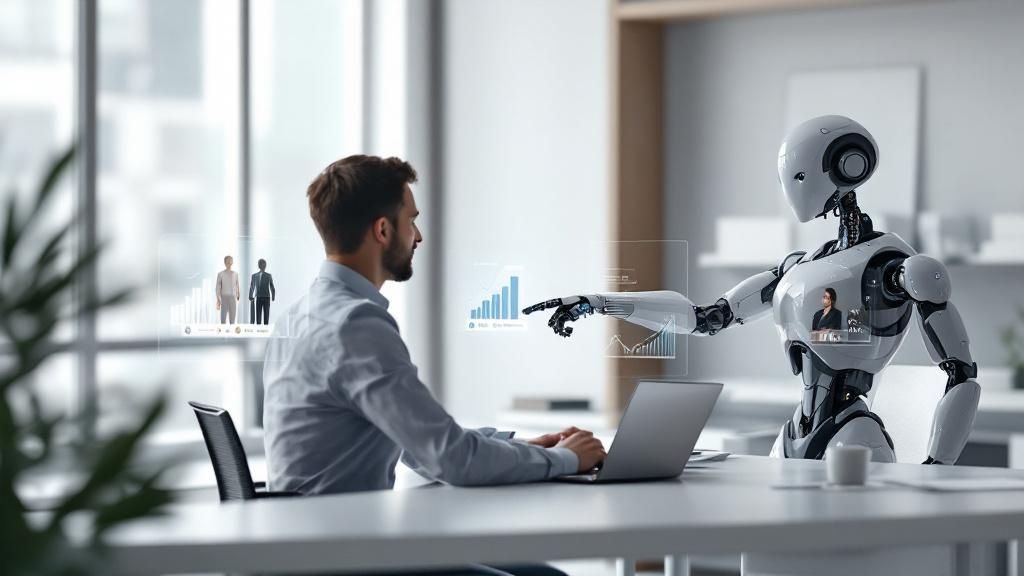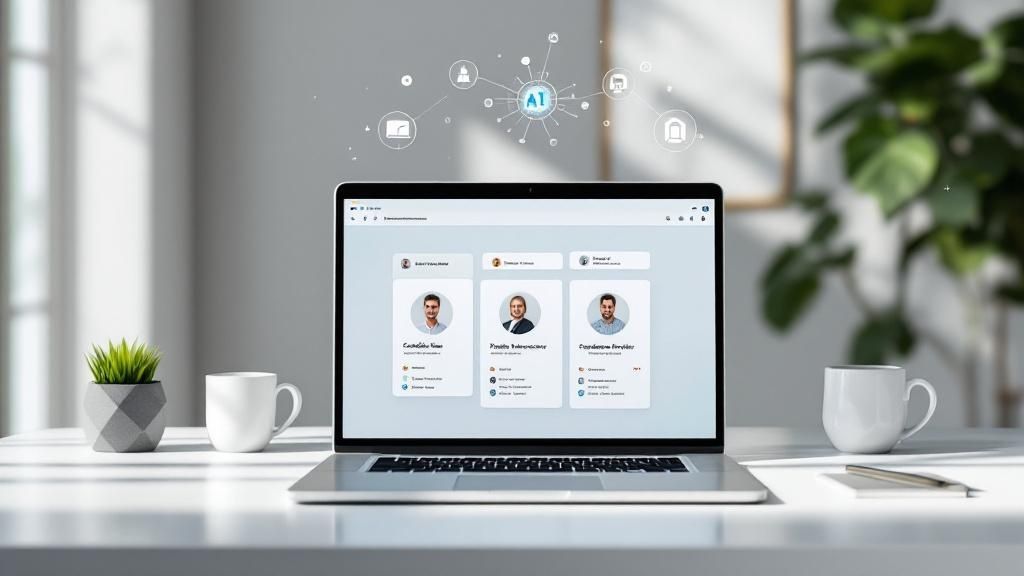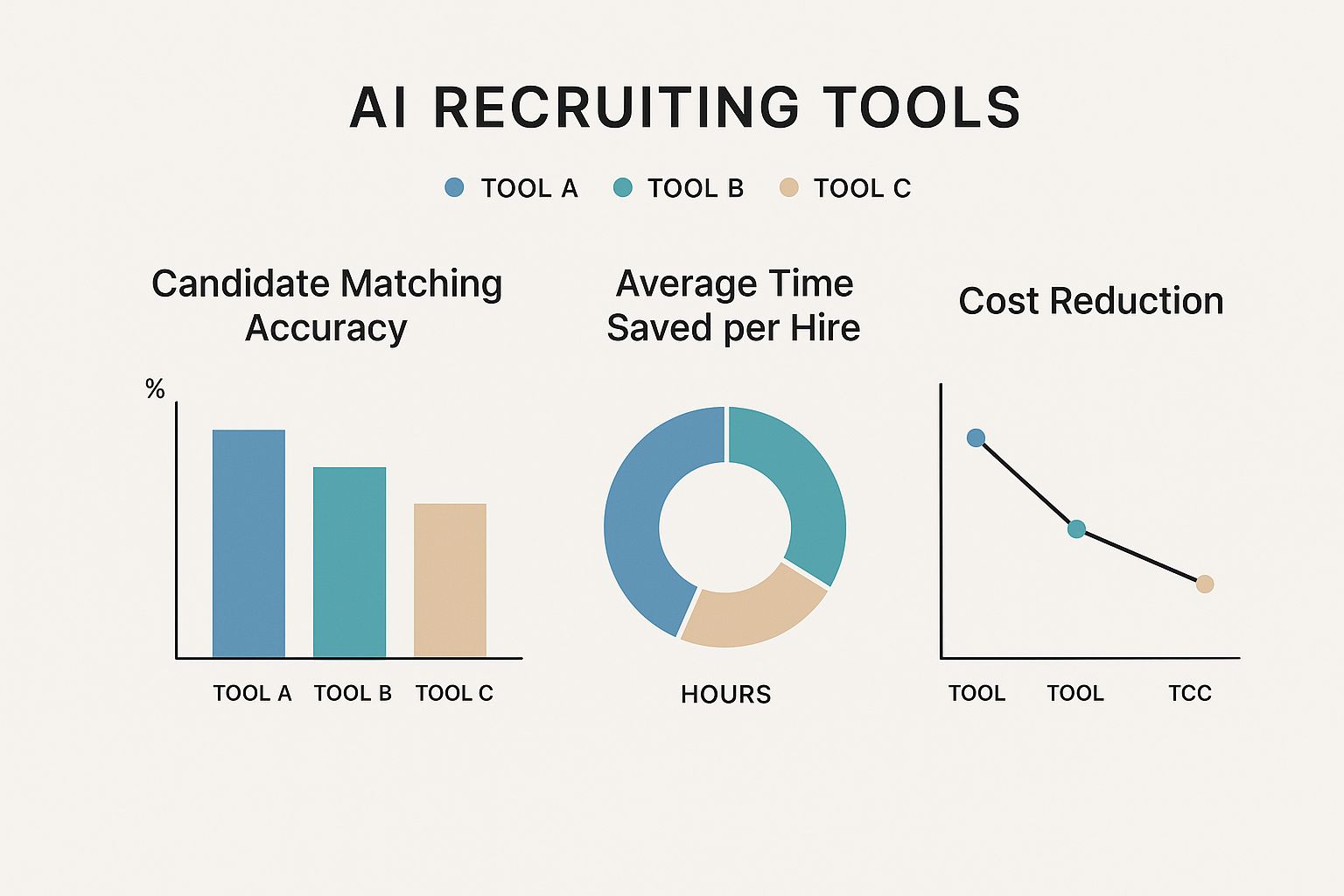August 29, 2025
Finding the Best AI Recruiting Tools for Hiring

The best AI recruiting tools do more than just speed things up; they completely change the game, shifting hiring from a manual grind to a data-backed strategy. If you're swamped with applications, the right platform can automate the initial screening and scheduling. If you're after highly specialized talent, it can pinpoint and connect with passive candidates far more effectively than any old-school method.
The Real Impact of AI on Modern Recruiting

Let's be honest, recruiting has always had its bottlenecks. Many recruiters burn up to 40% of their week just sifting through resumes and scheduling interviews. AI tools step in to handle those repetitive duties, freeing up your team for the work that actually requires a human touch—like building genuine relationships with candidates and figuring out who will truly thrive in your company culture.
This isn't just about saving time. It’s about transforming the entire function from a reactive, process-heavy department into a proactive, strategic one. Instead of drowning in a sea of resumes for one open role, your recruiters can jump straight to engaging with a shortlist of the most qualified people.
From Manual Workflows to Strategic Hiring
The real power of AI in recruiting is its ability to bring consistency and objectivity to the table. We all have unconscious biases, but a well-designed algorithm evaluates every single candidate against the same set of skill-based criteria. This helps level the playing field, ultimately leading to more diverse and capable teams.
This evolution is also reshaping the job market itself. We're seeing brand-new, highly specialized roles pop up, which is a direct result of AI's growing influence. For example, looking at trends for hiring AI developers in 2025 shows just how quickly technology creates demand for new expertise, forcing recruiters to get much smarter about how they find people.
By automating the top of the funnel, AI doesn't just make recruiting faster—it makes it smarter. It provides the data needed to make informed decisions, identify hidden talent pools, and ultimately improve the quality of every hire.
At the end of the day, the goal isn't to replace recruiters—it's to supercharge them. By offloading the logistical headaches, the best AI recruiting tools let talent professionals focus on what they do best: connecting great people with the right opportunities. You can dive deeper into how this works in our guide on AI for talent acquisition.
How AI Tools Are Reshaping the Hiring Lifecycle
Let's be clear: artificial intelligence in hiring isn't some far-off concept. It's here now, and it’s fundamentally changing how we find and hire people. At every step, from sourcing candidates to analyzing results, the best AI recruiting tools are taking over the grunt work and delivering sharp insights, helping teams move faster and make smarter decisions.
Think about the old way of doing things: spending days buried in a mountain of resumes. AI platforms can now screen, score, and shortlist the best candidates in minutes. And this isn't just basic keyword matching. Modern tools are smart enough to understand context, weigh experience, and gauge skill relevance, giving you a much clearer picture of who actually fits the role.
Optimizing Every Stage of Recruitment
This change is happening across the entire hiring journey. We're seeing AI-powered chatbots engage candidates around the clock, answering questions and scheduling interviews without a recruiter lifting a finger. This keeps the process moving and ensures every applicant gets a consistent, responsive experience—something that used to be impossible with high-volume hiring.
Beyond that, these platforms offer analytics that most organizations could only dream of before. You can track everything: time-to-hire, where your best candidates are coming from, and where people are dropping out of the funnel. This data gives you a real, evidence-based roadmap to fix bottlenecks and refine your entire hiring strategy.
The real power of AI in hiring is its ability to manage scale without dropping the ball on quality. It can sift through massive amounts of data to find the right people, personalize communication, and deliver analytics that turn a recruiter from a process-pusher into a genuine strategic advisor.
The Growing Market for AI in Hiring
The proof is in the numbers. The global AI recruitment market was valued at around USD 707.52 million in 2025 and is on track to hit USD 1.39 billion by 2035. This boom is fueled by constant investment in technology designed to automate repetitive work like resume screening and candidate outreach. You can get a closer look at the AI recruitment market projections on Research Nester.
The chart below from Research Nester really paints a picture of this growth, breaking down the market's value by its different parts.

The trend is undeniable. Companies are turning to AI to get an edge in a competitive talent market, which makes picking the right tool less of a technical choice and more of a critical business decision.
Comparing The Top AI Recruiting Platforms
Picking the right AI recruiting tool isn't about finding a single "best" platform. It's about finding the one that directly attacks your biggest hiring headaches. Different tools are built for different jobs—some are brilliant at high-volume automation, while others offer deep talent intelligence. Putting them side-by-side shows you exactly where each one shines and which is the right fit for your team.
This visual gives you a snapshot of key performance metrics, illustrating how these tools can deliver real-world results in matching accuracy, time savings, and cost reduction.

The data makes it clear: while any of these tools can help, their specific impact on efficiency and accuracy varies quite a bit. This just reinforces the need to match a tool's strengths to your primary goals.
H3: Sourcing And Screening Capabilities
Great recruiting always starts with finding and screening the right people. This is the first place AI tools prove their worth, but they don't all approach it the same way.
SeekOut is a sourcing powerhouse. It’s built to find passive and underrepresented talent with advanced filters and incredibly deep profile data. If your team is laser-focused on diversity and inclusion or needs to fill highly specialized technical roles, SeekOut is a top contender.
Klearskill, on the other hand, is all about screening accuracy. Its AI goes deep on resumes, analyzing them for skill compatibility and relevant experience to generate a precise matching score. This makes it a lifesaver for companies buried in high application volumes that need to surface the best-fit candidates from their talent pool quickly and without bias.
H3: Candidate Engagement And Automation
Once you have candidates in your pipeline, the game shifts to keeping them engaged and moving them through the process without friction.
This is where Paradox and its AI assistant, Olivia, truly excel. It automates scheduling, answers candidate questions 24/7, and keeps applicants in the loop with a surprisingly human-like chatbot. For high-volume hiring in industries like retail or hospitality, where a fast, responsive process is everything, Paradox is a game-changer.
Eightfold AI offers a much broader, more holistic solution. It’s a full-blown talent intelligence suite that not only engages external candidates but also uncovers internal mobility opportunities. It helps big companies retain their best people by matching current employees to new roles, making it a strategic asset for enterprise-level workforce planning.
For a closer look at how different platforms handle these challenges, check out our guide on AI tools for recruitment.
H3: A Head-To-Head Comparison
To make the differences even clearer, let's put these tools into a direct comparison table. This breakdown shows how each platform handles core recruiting functions.
Feature Comparison of Leading AI Recruiting Tools
This table provides a side-by-side comparison of key features and capabilities across top AI recruiting platforms, helping you identify the best fit for your organization's needs.
The best choice really comes down to your primary bottleneck. Are you drowning in resumes? Klearskill’s screening precision is what you need. Are you losing great candidates because scheduling is too slow? Paradox’s automation is the fix.
Ultimately, you have to look past the feature lists and understand the core philosophy behind each tool. Klearskill and Paradox are built to optimize very specific, high-impact stages of the external hiring process. In contrast, Eightfold AI and SeekOut provide broader intelligence and sourcing power that fuel a more strategic talent acquisition function.
Putting AI Tools into Practice with Real-World Use Cases
Knowing a tool's features is one thing, but seeing how it actually performs on the job is another entirely. The right AI recruiting tool for you really depends on the hiring scenario you're facing. An AI's role isn't fixed—it flexes based on the volume and complexity of the roles you need to fill.
Take high-volume, entry-level hiring, for example. Think call center agents or frontline retail staff. Here, AI can become your automation workhorse. It can own the entire top-of-funnel process, handling everything from initial screening and answering FAQs to getting interviews on the calendar.
In these situations, the AI functions almost like an extra team member, taking the logistical weight off your recruiters' shoulders. That frees them up to focus on what matters: final-stage interviews and making offers. This is where tools built for mass engagement and scheduling automation really show their value.
From High-Volume Automation to Intelligent Assistant
But the game completely changes when you’re hunting for a highly specialized or executive-level role. A company searching for a niche software engineer with a rare skillset can't just rely on broad automation. The AI’s function shifts from an automator to an intelligent assistant for the human recruiter.
Instead of plowing through thousands of applicants, the AI sifts through massive talent pools to surface a handful of passive candidates with that perfect mix of niche skills and experience. It gives the recruiter an edge in finding hidden gems, but the human touch—building relationships, selling the role, and judging cultural fit—remains front and center.
The 'best' AI recruiting tool is always context-dependent. Its value is measured by how well it solves a specific problem, whether that's managing 10,000 applications for a customer service role or finding one perfect candidate for a C-suite position.
This is the kind of adaptability that separates modern AI from older, more rigid automation software. A great AI learns and gets smarter over time, picking up on workflows and making better decisions without needing constant hand-holding.
Matching the Tool to the Task
Just how much you can lean on AI depends on the job's complexity. For high-volume, low-complexity roles where speed is everything, automation can handle up to 90% of the work. But for mid-level management roles, AI tends to play more of an assistive role. When you get to senior executive searches, where nuance and trust are paramount, it’s purely in a supportive, augmentative capacity. You can find more data on the role of AI in the recruitment market on Recruiterflow.
Let’s look at a couple of concrete scenarios:
Mass Call-Center Hiring: Imagine a company needing to hire 200 new agents. A platform like Paradox is a great fit. Its conversational AI, Olivia, can chat with thousands of applicants at once, screen for the basics, and book interviews 24/7, slashing the time-to-hire.
Sourcing a Niche Software Engineer: Now picture an organization looking for a Senior Machine Learning Engineer. They’d get more bang for their buck from a tool like Klearskill. Its advanced screening AI can analyze technical resumes with surgical precision, pinpointing candidates with the specific project experience and skill depth needed. This saves recruiters countless hours they would have spent manually sifting through unqualified profiles.
Understanding these different applications is key. Our guide on how to use AI in recruiting goes deeper into tailoring your strategy to your team's specific needs. At the end of the day, picking the right tool starts with an honest look at your biggest hiring bottlenecks.
How to Choose the Right AI Tool for Your Business

Choosing the right AI recruiting software isn’t just about ticking off features on a list. It’s about finding a solution that fits snugly into how you already work and actually solves the hiring headaches that keep you up at night.
The first move is to take a hard, honest look at your current process. You need to pinpoint where things are getting stuck. Are you losing top-tier candidates because your screening process drags on for weeks? Is building a diverse talent pipeline a constant struggle? Naming your biggest pain points gives you a clear target, guiding you to a tool that will make a real difference, not just another piece of software for your team to learn.
Define Your Objectives and Key Metrics
Once you’ve identified the problems, you need to decide what “fixed” actually looks like. A vague goal like "making hiring better" is useless. You have to get specific and set goals you can actually measure.
- Slash your time-to-hire: Aim to cut your average hiring timeline by a concrete number, like 25%, in the next two quarters.
- Boost screening efficiency: Set a goal to reduce the hours your team spends manually sifting through resumes, freeing them up for high-value work.
- Improve diversity numbers: Make it a priority to increase the representation of specific underrepresented groups in your applicant pool by a measurable percentage.
Having these clear KPIs does more than just help you pick the right tool; it gives you the evidence you need to prove its value later on. Your decision becomes a smart, data-driven business move instead of just a hunch.
Ask the Right Questions During Demos
When you start sitting through vendor demos, you need to show up with a game plan. A solid list of questions is your best defense against a slick sales pitch, helping you get to the heart of how the tool will actually perform for your team.
Don't just ask what the tool does. Ask how it does it. You need to understand the AI model it's built on, how it will connect with your existing systems, and what the vendor is doing to prevent bias. This is crucial for making a smart long-term investment.
A critical piece of the puzzle that often gets missed is data integrity. An AI is only as smart as the information it’s fed. To get accurate insights and run effective outreach campaigns, you’ll need solid data quality management tools working in the background.
Finally, remember that it's all about balance. Automation is great for efficiency, but you can't sacrifice the candidate experience. Ask vendors how their tool helps maintain a human touch, making sure applicants feel seen and respected, not just processed by an algorithm. The best platforms automate the tedious work, giving your recruiters more time to do what they do best: build the real human connections that turn great candidates into great hires.
Common Questions About AI Recruiting Tools
Diving into the world of AI recruiting platforms always brings up some important questions. It's only natural. From worrying about bias to figuring out if these tools will actually help your team, getting straight answers is essential before you invest. Let's tackle the most common concerns we hear from hiring teams.
Probably the biggest question on everyone's mind: will AI make recruiters obsolete? The answer is a resounding no. The best AI recruiting tools aren't here to replace human expertise; they're here to amplify it. Think of them as a powerful assistant that takes on the high-volume, repetitive work like sifting through hundreds of resumes or scheduling first-round interviews.
This frees up your recruiters to do what they do best—building relationships, digging into cultural fit, and using their intuition to make those critical final calls. It’s a partnership. AI handles the grunt work, so your team can focus on strategy and human connection.
How AI Tools Reduce Hiring Bias
Bias is another major concern, and rightly so. But when used correctly, AI can be one of your strongest allies in creating a fairer hiring process. A good platform can be set up to completely ignore demographic data during the initial screen—things like names, photos, or even graduation years that can trigger unconscious bias.
Instead, the AI focuses purely on the skills and qualifications you've defined for the role, evaluating every single applicant against the same objective standard. This data-first approach brings a level of consistency that's hard for humans to maintain, helping you build a more diverse and genuinely qualified talent pool.
Measuring the Return on Investment
Of course, any new tool has to justify its cost. To really understand the ROI of an AI recruiting platform, you need to look at the hard numbers, comparing your metrics before and after you bring it on board.
Get specific with your Key Performance Indicators (KPIs). Track things like:
- Time-to-hire: Are you filling roles faster?
- Cost-per-hire: Is your total investment to land a new employee going down?
- Quality of hire: How are your new folks performing after six months or a year? You can measure this with performance reviews and retention data.
Don't forget to look at recruiter productivity and candidate satisfaction scores, too. A solid platform should move the needle in all these areas, giving you clear proof of its value.
The global AI recruitment market is now worth around $661.56 million, and 87% of companies are using AI somewhere in their hiring workflow. Yet, 66% of U.S. adults are still wary of AI making hiring decisions, which just goes to show how important transparency is. You can dig into more of these AI recruiting statistics for 2025 on artsmart.ai.
At the end of the day, it's all about managing expectations. AI tools are incredibly powerful, but they work best when they're guided by a smart strategy and a human touch.
Ready to see how AI can transform your screening process with 99% bias elimination and 95% match accuracy? Discover how Klearskill empowers you to hire smarter, not harder. Get started with Klearskill today.
